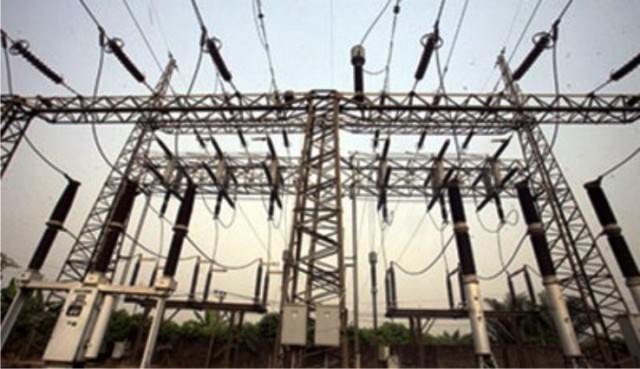Oil & Energy
Power Sector Loses N19.15bn In 10 Days

The nation’s power sector lost an estimated N19.15bn in 10 days due to constraints from insufficient gas supply, distribution and transmission infrastructure.
The losses were recorded in the 10 days to February 14, 2020, according to data from the Advisory Power Team in the Office of the Vice President.
The sector lost an estimated N1.96bn on February 14; N2.01bn on February 13; N2bn on February 12; N1.95bn on February 11; N2.15bn on February 10, and N1.95bn on February 9.
About N1.89bn was lost on February 8; N1.92bn on February 7; N1.77bn on February 6, and N1.55bn on February 5.
The average energy sent out on Friday, February 14, was 4,108 megawatts-hour/hour, up by 111.51 MW from the previous day.
The APT said 3,314 MW was not generated due to unavailability of gas; 188.6MW was not generated due to unavailability of transmission infrastructure, while 579.2MW was not generated due to high frequency resulting from unavailability of distribution infrastructure.
The average energy sent out last Thursday was 3,997 MWh/h, while 4,181.4MW was not generated due to gas shortage, unavailability of transmission and distribution infrastructure as well as water management.
The average energy sent out last Wednesday was 4,033 MWh/h while 4,171.4MW could not be generated by the power stations.
Last Tuesday, the average energy sent out was 3,994 MWh/h while available power generation capacity of 4,064,2M was idle.
Last Monday, the average energy sent out was 3,908 MWh/h while 4,476.4MW could not be generated by the power stations.
The average energy sent out was 3,929 MWh/h on February 9; 3,872 MWh/h on February 8; 4,040 MWh/h on February 7; 4,092 MWh/h on February 6; and 4,145 MWh/h on February 5.
The system operator put the nation’s installed generation capacity at 12,910.40MW; available capacity at 7,652.60MW; transmission wheeling capacity at 8,100MW; and the peak generation ever attained at 5,375MW.
The nation generates the bulk of its electricity from gas-fired power plants, while output from hydropower plants makes up about 30 per cent of the total.
The distribution and generation companies carved out of the defunct Power Holding Company of Nigeria were handed over to private investors on November 1, 2013, following the privatisation of the power sector.
More than six years after the privatisation, the investors who took over the power firms that emerged after the unbundling of the PHCN are still grappling with the old problems in the sector.
The sector is plagued with problems of gas supply shortages, limited distribution networks, limited transmission line capacity, huge metering gap, electricity theft, and high technical and commercial losses, among others.
Oil & Energy
Nigeria Loses More Crude Oil Than Some OPEC Members – Nwoko

Nigeria’s losses due to crude oil theft has been said to be more significant than those of some other members of the Organisation of Petroleum Exporting Countries(OPEC).
The Chairman, Senate Ad- hoc Committee on Crude Oil Theft, Senator Ned Nwoko, made this known in an interview with newsmen in Abuja.
Nwoko noted with dismay the detrimental impact of the issue, which, he said include economic damage, environmental destruction, and its impact on host communities.
According to him, the theft was not only weakening the Naira, but also depriving the nation of vital revenue needed for infrastructure, healthcare, education and social development.
The Senator representing Delta North Senatorial District described the scale of the theft as staggering, with reports indicating losses of over 200,000 barrels per day.
Nwoko disclosed that the ad hoc committee on Crude Oil Theft, which he chairs, recently had a two-day public hearing on the rampant theft of crude oil through illegal bunkering, pipeline vandalism, and the systemic gaps in the regulation and surveillance of the nation’s petroleum resources.
According to him, the public hearing was a pivotal step in addressing one of the most pressing challenges facing the nation.
‘’Nigeria loses billions of dollars annually to crude oil theft. This is severely undermining our economy, weakening the Naira and depriving the nation of vital revenue needed for infrastructure, healthcare, education, and social development.
‘’The scale of this theft is staggering, with reports indicating losses of over 200,000 barrels per day more than some OPEC member nations produce.
‘’This criminal enterprise fuels corruption, funds illegal activities and devastates our environment through spills and pollution.
‘’The public hearing was not just another talk shop; it was a decisive platform to uncover the root causes of crude oil theft, bunkering and pipeline vandalism.
‘’It was a platform to evaluate the effectiveness of existing surveillance, monitoring, and enforcement mechanisms; Identify regulatory and legislative gaps that enable these crimes to thrive.
‘’It was also to engage stakeholders, security agencies, host communities, oil companies, regulators, and experts to proffer actionable solutions; and strengthen legal frameworks to ensure stricter penalties and more efficient prosecution of offenders”, he said.
Nwoko noted that Nigeria’s survival depended
Oil & Energy
Tap Into Offshore Oil, Gas Opportunities, SNEPCO Urges Companies

Shell Nigeria Exploration and Production Company Ltd. (SNEPCo) has called on Nigerian companies to position themselves strategically to take full advantage of the growing opportunities in upcoming offshore and shallow water oil and gas projects.
The Managing Director, SNEPCO, Ronald Adams, made the call at the 5th Nigerian Oil and Gas Opportunity Fair (NOGOF) Conference, held in Yenagoa, Bayelsa State, last Thursday.
Adams highlighted the major projects, including Bonga Southwest Aparo, Bonga North, and the Bonga Main Life Extension, as key areas where Nigerian businesses can grow their capacity and increase their involvement.
“Shell Nigeria Exploration and Production Company Ltd. (SNEPCo) says Nigerian companies have a lot to benefit if they are prepared to take advantage of more opportunities in its offshore and shallow water oil and gas projects.
“Projects such as Bonga Southwest Aparo, Bonga North and Bonga Main Life Extension could grow Nigerian businesses and improve their expertise if they applied themselves seriously to executing higher value contracts”, Adams stated.
Adams noted that SNEPCo pioneered Nigeria’s deepwater oil exploration with the Bonga development and has since played a key role in growing local industry capacity.
He emphasized that Nigerian businesses could expand in key areas like logistics, drilling, and the construction of vital equipment such as subsea systems, mooring units, and gas processing facilities.
The SNEPCO boss explained that since production began at the Bonga field in 2005, SNEPCo has worked closely with Nigerian contractors to build systems and develop a skilled workforce capable of delivering projects safely, on time, and within budget both in Nigeria and across West Africa.
According to him, this long-term support has enabled local firms to take on key roles in managing the Bonga Floating, Production, Storage and Offloading (FPSO) vessel, which reached a major milestone by producing its one-billion barrel of oil on February 3, 2023.
Oil & Energy
Administrator Assures Community Of Improved Power Supply

The Emohua Local Government Area Administrator, Franklin Ajinwo, has pledged to improve electricity distribution in Oduoha Ogbakiri and its environs.
Ajinwo made the pledge recently while playing host in a courtesy visit to the Oduoha Ogbakiri Wezina Council of Chiefs, in his office in Rumuakunde.
He stated that arrangements are underway to enhance available power, reduce frequent outages, and promote steady electricity supply.
The move, he said, was aimed at boosting small and medium-scale businesses in the area.
“The essence of power is not just to have light at night. It’s for those who can use it to enhance their businesses”, he said.
The Administrator, who commended the peaceful nature of Ogbakiri people, urged the Chiefs to continue in promoting peace and stability, saying “meaningful development can only thrive in a peaceful environment”.
He also charged the Chiefs to protect existing infrastructure while promising to address the challenges faced by the community.
Earlier, the Oduoha Ogbakiri Wezina Council of Chiefs, led by HRH Eze Goodluck Mekwa Eleni Ekenta XV, expressed gratitude to the Administrator over his appointment and pledged their support to his administration.
The chiefs highlighted challenges facing the community to include incessant power outage, need for new transformers, and the completion of Community Secondary School, Oduoha.
The visit underscored the community’s expectations from the LGA administration.
With Ajinwo’s assurance of enhancing electricity distribution and promoting development, the people of Oduoha Ogbakiri said they look forward to a brighter future.
By: King Onunwor
-

 News3 days ago
News3 days agoCourt Sentences Gospel Singer To Death For Killing Girlfriend In Nasarawa
-

 Politics3 days ago
Politics3 days agoMakinde Renames Polytechnic After Late Ex-Gov
-
Sports3 days ago
Olympic Day Sparks Nationwide Fitness Fever
-

 Nation3 days ago
Nation3 days agoOgoni Stakeholders Hail Zabbey’s Performance
-
Sports3 days ago
I Joined Saudi League To Win Titles – Senegal Keeper
-

 Niger Delta3 days ago
Niger Delta3 days agoOBALGA Sole Administrator Presents Brand New Fire Extinguishers To Council …Commiserates With Traders Over Rumuomasi Market Fire Incident …Commences Desilting Of Drainages
-

 News3 days ago
News3 days agoWDD: Tinubu Seeks Global Action On Drug Abuse
-

 Featured3 days ago
Featured3 days agoTinubu Signs Four Tax Reform Bills Into Law …Says Nigeria Open For Business

